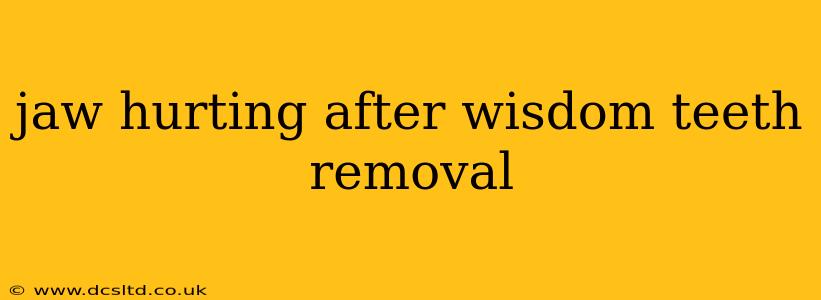Having your wisdom teeth removed is a common procedure, but the recovery process can be challenging. Many people experience jaw pain after the surgery, and understanding why this happens and how to manage it is crucial for a smooth recovery. This comprehensive guide will address common concerns and provide valuable information to help you navigate this phase comfortably.
Why Does My Jaw Hurt After Wisdom Teeth Removal?
Jaw pain after wisdom teeth extraction is a normal, albeit sometimes intense, part of the healing process. Several factors contribute to this discomfort:
- Surgical Trauma: The removal of wisdom teeth, particularly impacted ones, involves significant manipulation of the surrounding tissues and bone. This trauma causes inflammation and pain.
- Inflammation: Your body's natural inflammatory response to the surgery leads to swelling and pain in the jaw area. This is often most pronounced in the days immediately following the procedure.
- Nerve Irritation: The nerves in your jaw can be temporarily irritated during the surgery, leading to pain and discomfort. This usually subsides as the tissues heal.
- Dry Socket: A serious complication called dry socket (alveolar osteitis) can occur when the blood clot protecting the extraction site dislodges. This exposes the bone and nerves, causing severe, throbbing pain. This is less common but needs immediate attention.
- Muscle Strain: Opening your mouth wide during the procedure, and potentially clenching your jaw due to pain, can lead to muscle strain and soreness.
How Long Will My Jaw Hurt After Wisdom Teeth Removal?
The duration of jaw pain varies from person to person. Generally, you should expect some level of discomfort for several days to a couple of weeks. The most intense pain is usually felt in the first 24-72 hours. Pain should gradually decrease as healing progresses. If the pain persists or worsens after a week or two, consult your oral surgeon immediately.
What Can I Do to Relieve Jaw Pain After Wisdom Teeth Removal?
Managing post-operative jaw pain is vital for a comfortable recovery. Here are some effective strategies:
- Follow your surgeon's instructions carefully: This includes taking prescribed medication as directed and following post-operative care recommendations meticulously.
- Ice Packs: Applying ice packs to the affected area for 15-20 minutes at a time, several times a day, can help reduce swelling and pain.
- Over-the-Counter Pain Relievers: Ibuprofen or acetaminophen can help manage mild to moderate pain. Always follow the recommended dosage.
- Saltwater Rinses: Gently rinsing your mouth with warm saltwater several times a day can help keep the extraction site clean and promote healing.
- Soft Foods: Stick to a soft food diet for the first few days to avoid putting pressure on the extraction sites. Think soups, mashed potatoes, yogurt, and applesauce.
- Rest: Ample rest is crucial for healing. Avoid strenuous activities and get plenty of sleep.
- Avoid Straws: The suction created by straws can dislodge the blood clot, leading to a dry socket.
When Should I See a Doctor About My Jaw Pain?
While some jaw pain is expected, it's crucial to seek immediate medical attention if you experience:
- Severe, persistent pain that doesn't respond to medication.
- Signs of infection, such as fever, increased swelling, or pus.
- Excessive bleeding.
- Numbness or tingling that persists.
- Difficulty breathing or swallowing.
Is it Normal to Have Jaw Stiffness After Wisdom Teeth Removal?
Yes, some jaw stiffness is common after wisdom teeth removal due to the surgical trauma and inflammation. Gentle jaw exercises, as recommended by your surgeon, can help improve mobility and reduce stiffness. Avoid excessive opening or clenching of your jaw during recovery.
Can I Exercise After Wisdom Teeth Removal?
You should avoid strenuous exercise for at least a few days after wisdom teeth removal. Gentle activity is usually fine once the initial pain and swelling subside, but always listen to your body and avoid anything that causes pain or discomfort. Check with your surgeon for specific recommendations based on your situation.
This information is for general knowledge and should not be considered medical advice. Always consult your dentist or oral surgeon for personalized advice and treatment related to your wisdom teeth extraction and jaw pain. Remember, proactive management and prompt attention to any concerning symptoms can ensure a faster and more comfortable recovery.
